| Listing 1 - 10 of 34 | << page >> |
Sort by
|
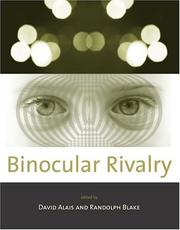
ISBN: 026201212X 026231620X 9780262316200 9780262012126 Year: 2005 Publisher: Cambridge (Mass.) MIT Press
Abstract | Keywords | Export | Availability | Bookmark
 Loading...
Loading...Choose an application
- Reference Manager
- EndNote
- RefWorks (Direct export to RefWorks)
Recent work on perceptual ambiguity and its implications for the correlation between neural events and perceptual experience. Researchers today in neuroscience and cognitive psychology increasingly turn their attention to binocular rivalry and other forms of perceptual ambiguity or bistability. The study of fluctuations in visual perception in the face of unchanging visual input offers a means for understanding the link between neural events and visual events, including visual awareness. Some neuroscientists believe that binocular rivalry reveals a fundamental aspect of human cognition and provides a way to isolate and study brain areas involved in attention and selection. The eighteen essays collected in Binocular Rivalry present the most recent theoretical and empirical work on this key topic by leading researchers in the field. After the opening chapter's overview of the major characteristics of binocular rivalry in their historical contexts, the contributors consider topics ranging from the basic phenomenon of perceptual ambiguity to brain models and neural networks. The essays illustrate the potential power of the study of perceptual ambiguity as a tool for learning about the neural concomitants of visual awareness, or, as they have been called, the "neural correlates of consciousness."
Binocular rivalry. --- Retinal rivalry --- Rivalry, Binocular --- Binocular vision --- Visual perception --- NEUROSCIENCE/General --- NEUROSCIENCE/Visual Neuroscience
Book
ISBN: 128325865X 9786613258656 026229835X 9780262298353 9781283258654 9780262015776 0262015773 Year: 2011 Publisher: Cambridge, Mass. MIT Press
Abstract | Keywords | Export | Availability | Bookmark
 Loading...
Loading...Choose an application
- Reference Manager
- EndNote
- RefWorks (Direct export to RefWorks)
State-of-the-art research on MRFs, successful MRF applications, and advanced topics for future study.
Image processing --- Computer graphics --- Computer vision --- Markov random fields. --- Mathematics. --- NEUROSCIENCE/Visual Neuroscience --- COMPUTER SCIENCE/General
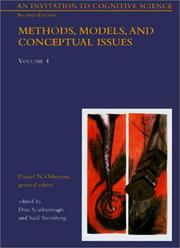
ISBN: 0262650460 026215045X 0262281090 0585053758 9780585053752 9780262281096 0262650452 9780262650458 9780262150453 9780262650465 Year: 1998 Publisher: Cambridge (Mass.) : MIT press,
Abstract | Keywords | Export | Availability | Bookmark
 Loading...
Loading...Choose an application
- Reference Manager
- EndNote
- RefWorks (Direct export to RefWorks)
An Invitation to Cognitive Science provides a point of entry into the vast realm of cognitive science, offering selected examples of issues and theories from many of its subfields. All of the volumes in the second edition contain substantially revised and as well as entirely new chapters.Rather than surveying theories and data in the manner characteristic of many introductory textbooks in the field, An Invitation to Cognitive Science employs a unique case study approach, presenting a focused research topic in some depth and relying on suggested readings to convey the breadth of views and results. Each chapter tells a coherent scientific story, whether developing themes and ideas or describing a particular model and exploring its implications.The volumes are self contained and can be used individually in upper-level undergraduate and graduate courses ranging from introductory psychology, linguistics, cognitive science, and decision sciences, to social psychology, philosophy of mind, rationality, language, and vision science.
Cognitive psychology --- #PBIB:1998.3 --- Cognition. --- Psychology --- Cognitive science. --- NEUROSCIENCE/Visual Neuroscience --- COGNITIVE SCIENCES/General --- Science --- Philosophy of mind
Book
ISBN: 026232296X Year: 2014 Publisher: Cambridge, MA : The MIT Press,
Abstract | Keywords | Export | Availability | Bookmark
 Loading...
Loading...Choose an application
- Reference Manager
- EndNote
- RefWorks (Direct export to RefWorks)
The goal of structured prediction is to build machine learning models that predict relational information that itself has structure, such as being composed of multiple interrelated parts. These models, which reflect prior knowledge, task-specific relations, and constraints, are used in fields including computer vision, speech recognition, natural language processing, and computational biology. They can carry out such tasks as predicting a natural language sentence, or segmenting an image into meaningful components. These models are expressive and powerful, but exact computation is often intractable. A broad research effort in recent years has aimed at designing structured prediction models and approximate inference and learning procedures that are computationally efficient. This volume offers an overview of this recent research in order to make the work accessible to a broader research community. The chapters, by leading researchers in the field, cover a range of topics, including research trends, the linear programming relaxation approach, innovations in probabilistic modeling, recent theoretical progress, and resource-aware learning.Sebastian Nowozin is a Researcher in the Machine Learning and Perception group (MLP) at Microsoft Research, Cambridge, England. Peter V. Gehler is a Senior Researcher in the Perceiving Systems group at the Max Planck Institute for Intelligent Systems, T
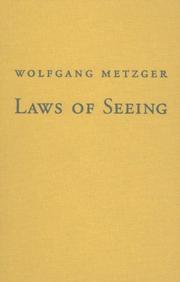
ISBN: 0262134675 9780262134675 9780262513364 9780262279710 0262279711 9781429477604 1429477601 0262513366 0262311704 1282098322 9786612098321 Year: 2006 Publisher: Cambridge, Mass. MIT
Abstract | Keywords | Export | Availability | Bookmark
 Loading...
Loading...Choose an application
- Reference Manager
- EndNote
- RefWorks (Direct export to RefWorks)
The first English translation of a classic work in vision science from 1936 by a leading figure in the Gestalt movement, covering topics that continue to be major issues in vision research today.This classic work in vision science, written by a leading figure in Germany's Gestalt movement in psychology and first published in 1936, addresses topics that remain of major interest to vision researchers today. Wolfgang Metzger's main argument, drawn from Gestalt theory, is that the objects we perceive in visual experience are not the objects themselves but perceptual effigies of those objects constructed by our brain according to natural rules. Gestalt concepts are currently being increasingly integrated into mainstream neuroscience by researchers proposing network processing beyond the classical receptive field. Metzger's discussion of such topics as ambiguous figures, hidden forms, camouflage, shadows and depth, and three-dimensional representations in paintings will interest anyone working in the field of vision and perception, including psychologists, biologists, neurophysiologists, and researchers in computational vision―and artists, designers, and philosophers.Each chapter is accompanied by compelling visual demonstrations of the phenomena described; the book includes 194 illustrations, drawn from visual science, art, and everyday experience, that invite readers to verify Metzger's observations for themselves. Today's researchers may find themselves pondering the intriguing question of what effect Metzger's theories might have had on vision research if Laws of Seeing and its treasure trove of perceptual observations had been available to the English-speaking world at the time of its writing.
Periodical
ISSN: 21642591
Abstract | Keywords | Export | Availability | Bookmark
 Loading...
Loading...Choose an application
- Reference Manager
- EndNote
- RefWorks (Direct export to RefWorks)
Eye --- Biotechnology --- Biomedical engineering --- Eye Diseases. --- Biomedical Technology. --- Diseases --- vision science --- visual disorders --- imaging technology --- regenerative medicine --- visual neuroscience --- physiological optics
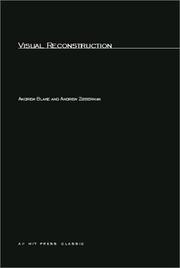
ISBN: 0262022710 9780262255769 9780262524063 0262255766 9780262022712 0262524066 Year: 1987 Publisher: Cambridge, Mass. : MIT Press,
Abstract | Keywords | Export | Availability | Bookmark
 Loading...
Loading...Choose an application
- Reference Manager
- EndNote
- RefWorks (Direct export to RefWorks)
"Visual Reconstruction presents a unified and highly original approach to the treatment of continuity in vision. It introduces, analyzes, and illustrates two new concepts. The first -- the weak continuity constraint -- is a concise, computational formalization of piecewise continuity. It is a mechanism for expressing the expectation that visual quantities such as intensity, surface color, and surface depth vary continuously almost everywhere, but with occasional abrupt changes. The second concept -- the graduated nonconvexity algorithm -- arises naturally from the first. It is an efficient, deterministic (nonrandom) algorithm for fitting piecewise continuous functions to visual data. The book first illustrates the breadth of application of reconstruction processes in vision with results that the authors' theory and program yield for a variety of problems. The mathematics of weak continuity and the graduated nonconvexity (GNC) algorithm are then developed carefully and progressively."
Pattern perception --- #TELE:MI2 --- Design perception --- Pattern recognition --- Form perception --- Perception --- Figure-ground perception --- Pattern perception. --- Engineering & Applied Sciences --- Computer Science --- NEUROSCIENCE/Visual Neuroscience --- COMPUTER SCIENCE/Artificial Intelligence
Book
ISBN: 0262015021 9786613119124 0262295555 1283119129 0262309327 9780262295550 9780262015028 Year: 2010 Publisher: Cambridge, Mass. : MIT Press,
Abstract | Keywords | Export | Availability | Bookmark
 Loading...
Loading...Choose an application
- Reference Manager
- EndNote
- RefWorks (Direct export to RefWorks)
Proposing a new paradigm for perceptual science that goes beyond standard information theory and digital computation. This book breaks with the conventional model of perception that views vision as a mere inference to an objective reality on the basis of "inverse optics." The authors offer the alternative view that perception is an expressive and awareness-generating process. Perception creates semantic information in such a way as to enable the observer to deal efficaciously with the chaotic and meaningless structure present at the physical boundary between the body and its surroundings. Vision is intentional by its very nature; visual qualities are essential and real, providing an aesthetic and meaningful interface to the structures of physics and the state of the brain. This view brings perception firmly in line with ethology and modern evolutionary biology and suggests new approaches in all disciplines that study, or require an understanding of, the ontology of mind.The book is the joint effort of a multidisciplinary group of authors. Topics covered include the relationships among stimuli, neuronal processes, and visual awareness. After considering the mind-dependent growing of information, the book treats time and dynamics; color, shape, and space; language and perception; perception, art, and design.
Visual perception. --- Cognitive neurosciences. --- Optics, Psychological --- Vision --- Psychological aspects --- Perception --- Visual discrimination --- Cognitive neuroscience. --- COGNITIVE SCIENCES/General --- NEUROSCIENCE/Visual Neuroscience --- Cognitive neuropsychology --- Cognitive science --- Neuropsychology
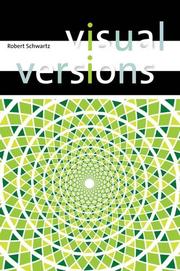
ISBN: 1282098144 9786612098147 0262283301 1429413107 9780262283304 9781429413107 0262195445 9780262195447 0262693348 9780262693349 Year: 2006 Publisher: Cambridge, Mass. MIT Press
Abstract | Keywords | Export | Availability | Bookmark
 Loading...
Loading...Choose an application
- Reference Manager
- EndNote
- RefWorks (Direct export to RefWorks)
These essays by Robert Schwartz on topics in the theory of vision are written from a pragmatic perspective. The issues and arguments will interest both philosophers and psychologists, covering new ground and bridging gaps between these disciplines. Schwartz begins historically, with discussions of problems raised and solutions offered in Bishop Berkeley's writings on vision, presenting Berkeley's views on spatial perception and the qualitative aspects of sensory experience in the context of recent theoretical and empirical work in vision theory. Schwartz then turns to debates in both the philosophical and psychological literature over the view that perception is inferential and thus "indirect." Critically surveying competing characterizations of the idea of "inferential processes" he argues the need either to reframe radically the question or drop the issue. Next, Schwartz discusses pictorial representation and research on picture perception. Drawing on the work of Nelson Goodman, Schwartz explains and defends the advantages of a symbolic approach to both topics. Finally, he examines the quagmires that often develop when metaphysical concerns about the "real" and our ability to perceive it infect discussions and claims in the theory of vision. After analyzing issues arising in current psychological research on "object" perception, Schwartz turns to debates over the supposed essential nature of colors. An appreciation of the empirical and theoretical work on color perception suggests that there is no single or privileged analysis of the notion of "real colors." Schwartz circles back in the end to what he calls "that old chestnut of the philosophy of perception"--controversies over "the objects of perception"--and takes an Austinian look at the topic.
Vision. --- Visual perception. --- Optics, Psychological --- Vision --- Eyesight --- Seeing --- Sight --- Psychological aspects --- Perception --- Visual discrimination --- Senses and sensation --- Blindfolds --- Eye --- Physiological optics --- NEUROSCIENCE/Visual Neuroscience
Book
ISBN: 128297839X 9786612978395 0262289318 026201453X 9780262289313 9781282978393 9780262014533 6612978392 Year: 2011 Publisher: Cambridge, Mass. MIT Press
Abstract | Keywords | Export | Availability | Bookmark
 Loading...
Loading...Choose an application
- Reference Manager
- EndNote
- RefWorks (Direct export to RefWorks)
The recognition of faces is a fundamental visual function with importance for social interaction and communication. This volume offers a state-of-the-art, interdisciplinary overview of recent work on dynamic faces from both biological and computational perspectives.
| Listing 1 - 10 of 34 | << page >> |
Sort by
|

 Search
Search Feedback
Feedback About UniCat
About UniCat  Help
Help News
News